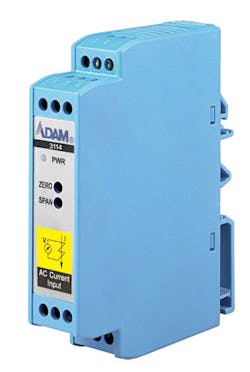Modules Reduce Interference
The ADAM-3112 is an isolated AC voltage to DC voltage module while the
ADAM-3114 is an isolated AC current to DC voltage module. These modules
possess high voltage isolation so that they can be exposed to severe
environments and still protect the system from high-voltage input or
power. Both modules provide 1,000VDC between output and power;
2,500VRMS between input and output and between input and power. The
ADAM-3112 provides three input modes, 0~120VRMS, 0~250VRMS, and
0~400VRMS in one single-signal conditioning module, eliminating the
need for three individual modules for different voltage-level
applications. Advantech Corp., Industrial Automation Groupwww.advantech.com/ea800.205.7940

